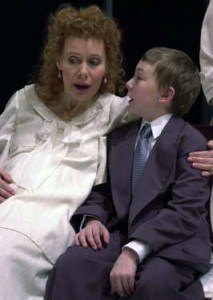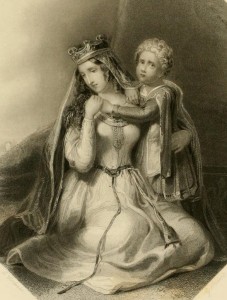
Hermione (Barbara Robertson) and Mamillius (Zach Gray), Photo by Michael Brosilow, Chicago Shakespeare Theatre, 2003.
Towards the end of Shakespeare’s life, early September must have been a sad time, not just because it signalled the end of summer. Both parents died at this time of year: his father was buried on 8 September 1601, and seven years later, on 9 September 1608, his mother Mary. We know little about Shakespeare’s parents. John came from the little village of Snitterfield where his father rented a farm owned by Mary’s father Robert. He was an ambitious young man, moving into Stratford-upon-Avon, learning to be a skilled glover, and getting himself onto the newly-established local council. Mary’s family lived in the village of Wilmcote, part of the “ancient and worthy family”, the Ardens. Mary was the youngest of eight sisters, and must have been a capable young woman as she was named as one of the executors of her father’s will as well as being a major beneficiary. John was lucky to catch a woman with an inheritance. The date and place of their marriage is unknown but probably took place during 1557, the year following Mary’s father’s death. There’s no evidence that either was educated, but their country background doesn’t mean they were completely illiterate.
Scientific studies are now proving that the first few years of a child’s life are crucial to their development. In Shakespeare’s time women were responsible for the rearing of young children, and his mother’s influence would have been very important. As John and Mary’s first surviving child, following two sisters who died young, William must have been dearly cherished.
Shakespeare writes several scenes showing young boys and their mothers in a close and affectionate relationship. In The Winter’s Tale Mamillius begins to tell his mother a story before the cosy scene is broken apart by Hermione’s arrest on suspicion of infidelity.
Hermione Come sir, …; ‘pray you, sit by us,
And tell’s a tale.
Mamillius Merry, or sad, shall’t be?
Hermione As merry as you will.
Mamillius A sad tale’s best for winter: I have one
Of sprites and goblins.
Hermione Let’s have that, good sir.
Come on, sit down, come on, and do your best
To fright me with your sprites: you’re powerful at it.
Mamillius There was a man –
Hermione Nay, come sit down: then on.
Mamillius Dwelt by a churchyard; I will tell it softly,
Yond crickets shall not hear it.
Hermione Come on then,
And giv’t me in mine ear.
Many of the children in Shakespeare’s plays are parted from their mothers by death or politics, the separation made more poignant by the distress of their mothers. In King John, Constance’s son Prince Arthur has been taken away from her:
Grief fills the room up of my absent child.
Lies in his bed, walks up and down with me,
Puts on his pretty looks, repeats his words,
Remembers me of all his gracious parts,
Stuffs out his vacant garments with his form;
Then have I reason to be fond of grief? …
O Lord! My boy, my Arthur, my fair son!
My life, my joy, my food, my all the world!
Richard III’s greatest crime is the killing of the little princes in the Tower of London. This event is the catalyst that unites three women, not natural allies, in cursing the man responsible for many deaths. A series of ritual incantations express their rawness of emotion, and can be one of the most powerful moments in the play.
Shakespeare knew what it felt like to lose a child, both from observing his own mother when as a 15-year old boy his 7-year old sister Ann, died, and from his own experience of losing his son Hamnet in 1596, aged only 11.



Interesting; but might have been improved by an illustrative quote from RIII.
Thanks for your comment! I’m glad you’re enjoying the blogs.
I was annoyed by the recent repetition of “Shakespeare was the son of an illiterate Glover” on BBC radio 4, and even if John was illiterate, so what, he didn’t write the plays, William did!
Michael Wood suggests that there is evidence that his mother could read and write, particularly in the way she handled a pen on one document. Mary was possibly only 18 or 19 years old when her father died and yet he obviously regarded her as an intelligent and reliable young woman who would be capable of taking on the responsibility as executor of his will. This would indicate both a level of literacy and numeracy, I think it also indicates that her father invested time and possibly money in acquiring some education for her (perhaps the clergyman at Aston Cantlow). As you say women were responsible for a child’s upbringing, so she may also have started William’s early education?
Thanks for your comment. I agree it would be wonderful to know more about Mary Arden as her mothering skills might have been crucial. She also had lots of sisters – I wonder if any of them too might have had a hand in bringing up William. Do we know anything about them?